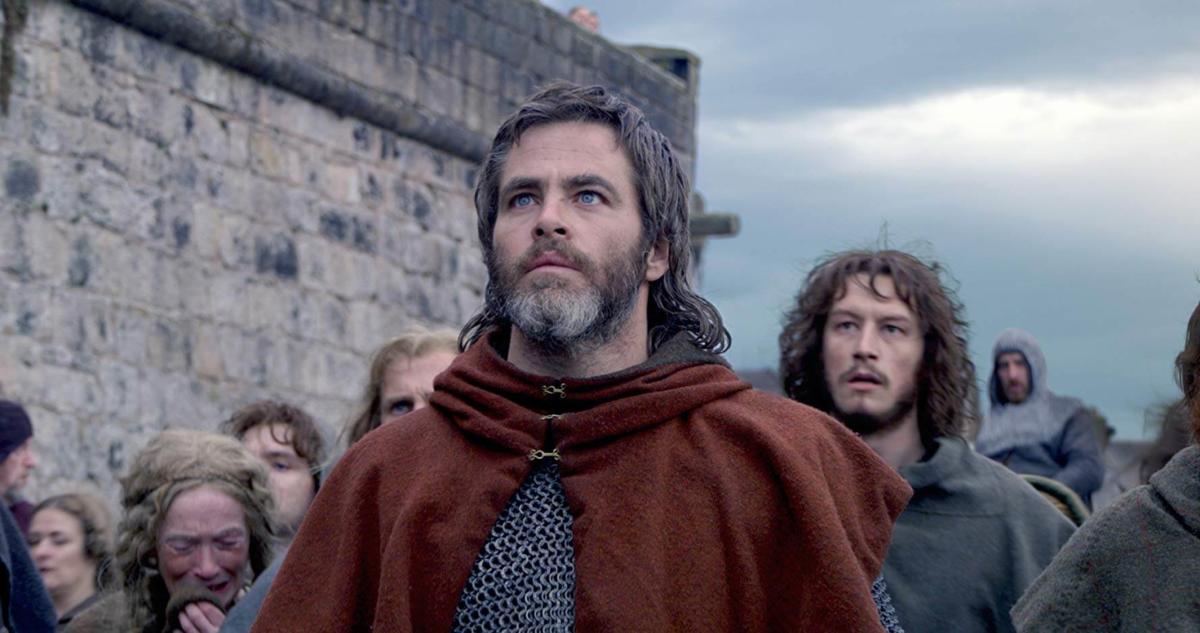Outlaw King starts almost where Braveheart ends. It’s 1204 and the Scottish rebellion, lead by William Wallace, has been crushed. Now the Scottish lords must pledge fealty to the English King Edward I (Stephen Dillane). In an eight-minute tracking shot, we watch Robert The Bruce (Chris Pine) and others kneel to the king in exchange for peace and the return of their lands, King Edward’s flighty son, the Hotspur-like Edward, Prince of Wales (Billy Howle), challenge Robert to a bout of macho sword-sparring, and a gigantic trebuchet lay siege to Falkirk castle. Its a strong beginning from David Mackenzie, director of Hell or High Water, boldly stating that Outlaw King will be a new type of swords-and-mud drama: daring, immersive, vital.
Robert is married to Elizabeth de Burgh (Florence Pugh) in an excessively mannered ceremony. The goddaughter of the English king, she is given to Robert as a peace gift. Ever the gentleman, he refuses to consummate the marriage, leading to a meeting of minds that will guide him in his latter revolution against the English. Credit has to be given to Pugh for playing her part with a lot of enthusiasm, turning what is usually a thankless role into an integral part of the movie.
Fast-forward two years later and Robert The Bruce is in the border town of Berwick. To his utter shock he finds mutilated parts of William Wallace, hung, drawn and quartered in London, paraded in the centre of the town. The ensuing carnage that follows is the best scene in the movie. With echoes of Andrei Rublev, it suggests that Outlaw King will be a truly rousing historical recreation. The final product – cut to two hours from an original 137-minute runtime – never really delivers on this promise, suffering not only from the burden of history, but a lack of narrative momentum and a fuzzy approach to maintaining true drama. Feeling at times like a de-mythologised version of Game of Thrones – and also featuring copious nudity and dramatic deaths – Outlaw King can’t make its mind up on what type of movie it wants to be. Neither a full-on immersive experience or a sweeping epic, it lacks any gripping sense of urgency, giving us little reason to actually care about the Scottish revolution.
My central issue with the film is with Robert The Bruce himself. Chris Pine’s performance is refined, subtle. His Bruce is a relaxed and kind man instead of the kind of brutal leader needed to stage a successful revolution. He has little of the mania or blood-and-lust charisma that characterised Mel Gibson as William Wallace in Braveheart. Even his climactic speech is anti-climactic, an ode to humility so deeply uninspiring it’s a miracle the men even bothered to fight at all. There is intention behind all this, and it is to analyse machismo and violence beyond the cliché, but it hardly makes for rousing drama. He’s a really nice guy, which is something that might have worked in Wonder Woman, but which feels like ahistorical nonsense given the context of the time. This is doubly strange considering the great care Mackenzie otherwise puts into making the film feel historically accurate.
This is even more jarring when so much of the movie feels like an exercise in pure machismo. The soundtrack prioritises hammering strings a lá Hans Zimmer instead of anything sweeping or tune heavy. The camera often shoots directly into the sun, light covering the camera completely as if we are right there in the action, and the violence is extremely brutal, including stabbings, mutilations, and horse tramplings. But it’s all drowned out by too much conversation. Not exciting conversation like in the Lord of The Rings about the true reason why never to give up hope, but banal talk about what to do next, whether this or that person will help Robert, and endless, endless tactics.
The ponderousness of it all leads to a final battle that I didn’t guess was the actual final battle. Although suitably impressive, shooting a mass of legs and swords and mud and confusion like Orson Welles in Chimes of Midnight, it didn’t feel like a conclusion to a movie – which is then hastily wrapped up with unnecessary added post-script. It’s a frustrating watch as there’s probably a good movie in there somewhere. Perhaps Mackenzie should go back to the drawing board and cut another twenty minutes.
Some of the coverage you find on Cultured Vultures contains affiliate links, which provide us with small commissions based on purchases made from visiting our site.

